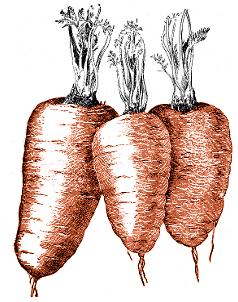Posts tagged ‘bristol’
Posted in Practicalities on Sunday, February 5th 2012 (6.03 PM).
This afternoon: a seed swapping event at my favourite cinema, The Cube off King Square. I felt rather sheepish going along, because I felt I didn’t have any seeds to take. I do have seeds I’ve saved, but I have no idea at all if any of them are viable, so didn’t feel I could pass them on to the rest of the Bristol gardening community quite yet.
However, it wasn’t a wasted trip, because there was plenty to do besides swap seeds. There was a Compost Cam showing people just how entrancing worms can be to watch; there were taste tests inviting you to spot the home-grown food; and, being a cinema, there were documentary showings. I was particularly interested by one, a BBC documentary from two or three years ago, on the future of farming. In a nutshell: modern farming is doomed. Modern farming needs oil, lots of it, both for combustion engines and for chemical feedstock. As the oil industry declines, modern farming – and the entire modern food economy – will rapidly become unaffordable. All very depressing. The answer, according to the programme, is in seeing biodiversity as an essential part of food production rather than just something that gives us pretty wildlife; in designing agricultural systems which work with rather than against our natural environment; and in a move away from factory-scale agriculture towards smallholdings, because organic smallholdings, run by gardeners rather than farmers, can produce rather more food per acre than an industrial farm can. One thinks here of the Soviet Union, where despite the vast acreage of mechanised kolkhoz and sovkhoz farms, all of the quality food, and a big proportion of the staples, was cultivated on the smallholdings of kolkhoz employees in their spare time and sold in barely-tolerated private markets. Gardeners are better than farmers, it seems. Unfortunately, this is because gardeners devote much more time and attention to each square metre of land than a farmer can, and any sort of smallholding-based solution to the oncoming food supply problem will mean social change at an earth-shattering level.
The other question which comes up regularly in my mind, which the documentary reminded me of, is: just how sustainable, in the long term, is the sort of small-back-garden container gardening that I do? Because, on the face of it, it doesn’t seem to be the healthiest form of gardening. Sustainability is all about generating healthy, fertile soil, soil with its own ecosystem. The ecosystem is needed to replace everything that my plants take away, to replace everything that ends up in my dinner, and if nothing ever goes back into the soil to replace that the soil ends up dead. The general “conventional” guideline for container gardening seems to be: “use fresh compost; grow your plants; your compost is now exhausted”. That process isn’t going to build up any sort of long term sustainability.
I do have some thoughts and ideas about the above: how to make container gardening more sustainable, at the systemic level. The container garden equivalent of the medieval three-field system, maybe. This post is already well into TLDR territory, so those thoughts will come later. In other news, I just hope that the Cube do hold another event next year, when I can donate more to the proceedings myself.
bristol, farming, saving seed, seed, seed swap, sustainability
Posted in Inspiration on Saturday, January 28th 2012 (5.41 PM).
The last inspiration post was a cemetery in distant Berlin. Today’s inspiration is also a cemetery, but one a bit closer to home. Arno’s Vale, in Totterdown, Bristol.
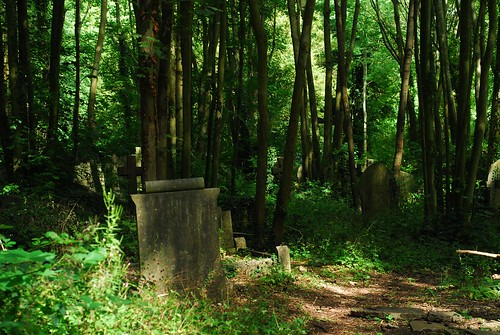
Arno’s Vale today is a beautiful wooded spot: but it was never intended to look quite like this. It was designed as a garden cemetery, a carefully-manicured hillside opened in 1839, the same year as Highgate Cemetery and a few years after the pioneering Kensal Green Cemetery. Like Kensal Green, it was run as a commercial business; and it was very successful for many years.
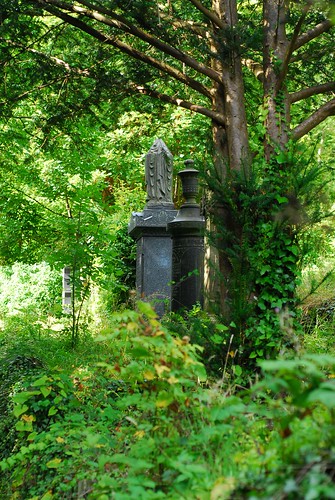
Unlike Kensal Green, Arno’s Vale started to run out of space in the 20th century; and as new burials fell, the viability of the cemetery as a business also started to fade. The cemetery management had to cut back on maintenance staff; and as they did so, trees and undergrowth started to take over. By the time the business finally went under, the cemetery was completely overgrown.
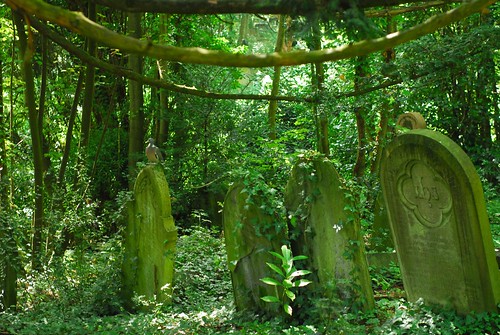
In more recent years the cemetery was saved from both too much decay, and the threat of redevelopment, by a group of campaigners. It now is owned by the city council, but managed and maintained by a charitable trust with the help of many volunteers.
arnos vale, brislington, bristol, cemetery, forest, overgrown, public garden, totterdown, undergrowth
Posted in Experimentation, Garden Diary, Photobloggery, Planning, The Old Garden In Bristol on Sunday, January 15th 2012 (11.21 AM).
Given the crisp winter weather yesterday, we went out for a walk: down to Spike Island, along the New Cut, then back round in a circle through the back streets of Southville. I noticed, all of the rosemary bushes in the front gardens of Southville are in flower at the moment. Even in January.
The rosemary bush in our garden on the other side of the city is not in flower. I say “bush”: possibly “sprig” is a slightly better word. There are signs, though, that it might be starting to bud, pale green growing tips at the base of each leaf. Something is developing, at least; I don’t know much about rosemary yet.
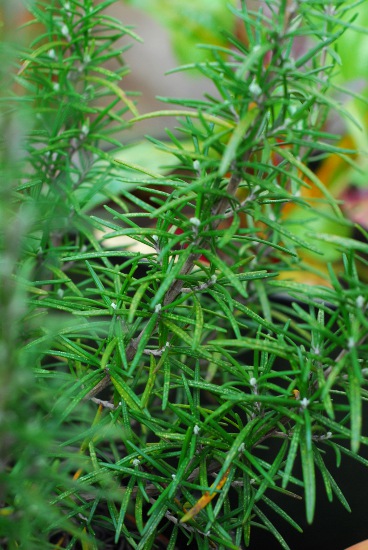
In other news, we’ve been trying to do a bit more planning on what to grow this year. We had a good harvest last year from the peas we planted, but before the season was over the plants were suffering rather badly from mildew, possibly because we planted slightly too many in each box – after all, when you only have so much space it is tempting.
I have no idea what pea variety we grew last year. Towards the end of the planting season, we popped down to the garden centre, bought whatever type of pea seedlings they had available, and that was that. “Pea” was all it said on the label. For this season, therefore, we have deliberately gone out and bought seed of a disease-resistant variety: P. sativum “Boogie”. Whether they are as tasty or fruitful as last year’s anonymous ones, we will have to wait and see, but the packet of seed peas is ready and waiting in the seed tin.
boogie, bristol, disease, flowering, mildew, pea, rosemary, southville, unseasonal, winter
Posted in Practicalities, The Old Garden In Bristol on Sunday, October 30th 2011 (8.50 PM).
As I think I mentioned a while ago, shortly after we moved into Symbolic Towers we noticed a vinelike plant spreading itself rapidly over the garden trellis. None there at all when we moved in, but within a couple of months the trellis was covered. Bindweed. It seems to be endemic in this part of Bristol: you can’t go anywhere this time of year without seeing its foliage and its white trumpets clogging up fences and doing their best to strangle other plants, particularly in semi-wild areas like the edges of railway lines. We’ve spent a lot of time tracing every stalk, and digging up every little bit of bindweek rhizome we could find; carefully, like archaeologists, to make sure we didn’t break the rhizomes up or leave fragments behind. It has mostly worked: a few stems have come back, but only a few, none of them very strong. On those, we tried a method we heard on Gardeners’ Question Time: singing and blackening the leaves. It worked, too, sort of, although (of course) not as effectively as physical removal.
I was aware, of course, that things could have been far, far worse. Moreover, I was reminded by a news story K came across, about Japanese knotweed. It reminded me of the advice I read in (I think) an Alys Fowler book: if you have knotweed, move house. There are knotweed-infested places in Bristol – Arno’s Vale cemetery, for one, and some parts of the riverbank in St Philips – and, if we visit any, we are always extremely careful not to go near the stuff. Over-careful, maybe, but it’s not something we could exactly risk.
bindweed, bristol, japanese knotweed, perennial weed, weed, weeding

